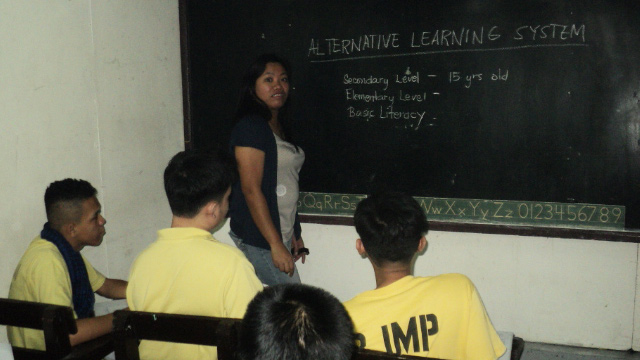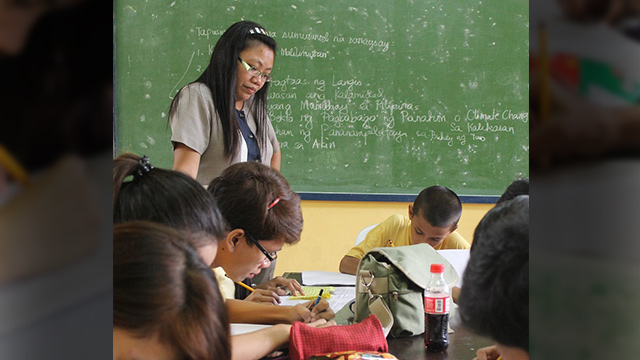SUMMARY
This is AI generated summarization, which may have errors. For context, always refer to the full article.

MANILA, Philippines – For the past decade, Irene Barzaga has been spending her Mondays, Wednesdays, and Fridays in jail.
It all started in 2004. She was in her mid-twenties, and her occupation finally reads: mobile teacher.
“Mobile teacher, kasi [we go] from one place to another place. Kung saan may needs dun kami pumupunta – hindi kami ang pinupuntahan,” Irene explains.
(We’re called mobile teachers because we go from one place to another place. We go to places where there are needs – [students] don’t go to us.)
As a former instructional manager, she waited two years to be a mobile teacher. But her experience in Barangay Manresa was quite upsetting for a first-timer: there were street children willing to learn, but the barangay was not supportive.
Then the Quezon City (QC) jail called. They asked her to continue the Alternative Learning System (ALS) program started by an NGO inside the detention center.
READ: Who’s excited about Saturday school?
Fortunately, she was more than willing to do the job.
“Boyish kasi ako eh. Una kong pasok [sa QC jail] panglalaki [pa] yung gupit ko,” she laughs while remembering how it all started.
(It’s because I’m boyish. When I first entered the QC jail, I even donned a guy’s haircut.)
More than teaching
It was easy blending with her new crowd. All she had to do was be herself, treat her inmate learners as tropa (friends), and learn how to communicate with them.
Like many mobile teachers, a day’s work includes teaching and a lot of counseling on the side.
But she does a lot of listening too, because behind those bars are stories left unheard – of men who could not read or write and were jailed because of it.
“Sa jail kasi ang binibigay mo sa kanila yung talagang pag-asa na kahit nasa loob sila ng kulungan, meron pa rin silang magagawa…May mga tao pa ring naniniwala sa kanila. Stigma [kasi] ‘pag nakulong ka, wala na eh. So realization din na hindi lahat ng taong nakukulong, may kasalanan.”
(What you really give to those in jail is the hope that even while imprisoned, they can still do something…There are people who believe in them. There’s a stigma that when you’re jailed, no hope is left. But I realized not all who are in jail are guilty.)
She believes in them, but says they need to believe in themselves too. So every class, she convinces them that ALS is more than just a past time: “O, baka yung mga iba dito kaya lang pumunta dito kasi gusto niyo lang magpalipas ng oras. Si Ms Irene po ay hindi pampalipas-oras.”
(Maybe some of you came here just to pass the time. Ms. Irene is not for passing time.)
Every June, about 80 learners attend Irene’s classes. This number fluctuates, and the ones who stay are those who, in Irene’s words, really want to change their lives.

The measure of success
Vacation is not in Irene’s vocabulary. If her Mondays, Wednesdays, and Fridays are dedicated to the city jail, Tuesdays, Thursdays and Sundays are for the out-of-school youths and adult learners of Barangay Tatalon.
Now Master Teacher 1, she also took up 4 loads in an elementary school nearby, where she still looks for possible ALS learners.
She could have reserved Saturdays for herself, but instead she’s taking up masteral studies in Special Education — for her students with learning disabilities and behavioral problems.
But she calls the QC jail her baby, the source of her fulfillment.
“Sabi nila ang successful daw yung mga taong naka-graduate. Sabi ko para sa akin hindi. Ang successful yung taong kahit ‘di nakapasa sa ALS basta nakita mong nagbago.”
(They say the successful ALS learners are those who graduate. I don’t think so. I think the successful one is the person who changes even if he or she fails the ALS.)
Next year marks her 10th year in the detention center. Her learners tease her about a grand celebration especially prepared for her.
She only wanted to teach, but she made friends along the way. – Rappler.com
Add a comment
How does this make you feel?
There are no comments yet. Add your comment to start the conversation.